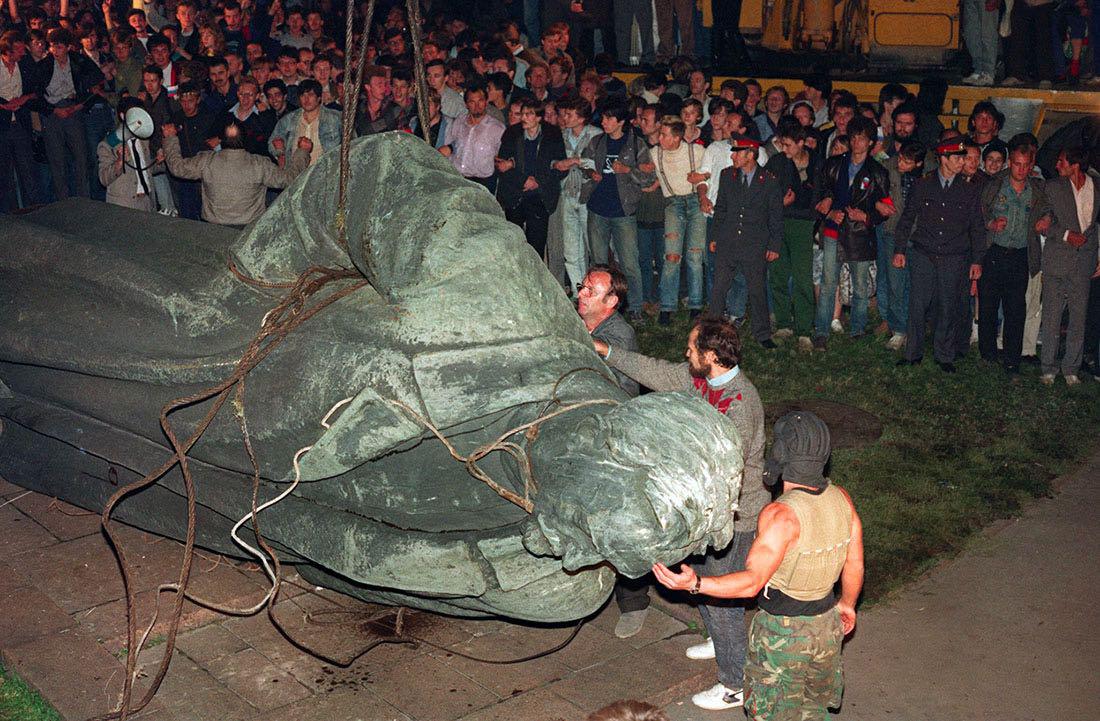Ukraine’s resolve to open the archives of the communist special services makes publicly available not only the files of persons who suffered from repression but also of those who, in a varying degree, cooperated with the Soviet regime. The latter may happen to be politicians, public figures, or friends and relatives of the victims like it was in a number of Central European countries. This imposes a particular responsibility on researchers, the state, and the society and puts them before difficult choices.
Read the previous part: Ukrainians discover stories of repressed relatives in newly opened KGB archives
In the early 80s, the writer Sergey Dovlatov, who had emigrated from the USSR to America, posed his famous question about Soviet history:
“We endlessly and, of course, rightly condemn Comrade Stalin. And yet I’d like to ask: who wrote four million denunciations?”
The last chief of the KGB Vadim Bakatin, appointed after the August 1991 coup, was the grandson of a Siberian accountant executed in 1937 for alleged participation in a “monarchical organization.” According to Bakatin’s memoirs, before the ultimate dissolution of the Soviet Union, dozens of KGB officers called on him to burn the agency’s archives in order to head off their falling into the hands of “reformers” and avoid the publication of their content.

Bakatin swept down those calls but later acknowledged that his predecessors in the KGB headquarters had obliterated massive amounts of archival data. The destroyed materials reportedly contained information on the abduction and probable murder of the Swedish diplomat Raoul Wallenberg (who saved thousands of Hungarian Jews during the Holocaust) by Stalin’s secret services, as well as KGB dossiers on the top hierarchs of the Russian Orthodox Church and hundreds of volumes of surveillance of the most celebrated Soviet dissidents, Nobel Prize winners Andrei Sakharov and Alexander Solzhenitsyn.
Some commentators tend to believe that KGB staff deliberately misled Bakatin, and the missing files might be discovered in the future. In 2012, former senior Russian archivist Anatoly Prokopenko insisted that back in 1991, he had seen a thick folder of materials concerning the Soviet intelligence surveillance of Wallenberg, the existence of which the KGB and its Russian successor (FSB) denied for years.
In the early 90s, Vadim Bakatin backed the wide declassification of the archival records. At the same time, he spoke strongly against granting public access to the multiple dossiers of the living agents who informed against their compatriots, referring to the threat of social upheaval. Bakatin refused the request of the first leader of independent Lithuania Vytautas Landsbergis, who demanded the return all the dossiers of KGB’s Lithuanian informants from Russia. The KGB had hastily withdrawn great numbers of its files from non-Russian republics of the USSR after anti-communist protesters in East Germany had seized secret documents of the Stasi.
In result, only a small part of the informants’ names have become known to the Lithuanian public. Among them was a close associate of Landsbergis, Independence Party leader Virgilijus Čepaitis, who said he felt free only when he acknowledged the fact of his past work for the KGB. As for the rest, the Lithuanian state guaranteed confidentiality and non-lustration in exchange for one’s voluntary acknowledgement of collaboration with Soviet state security. Nearly one thousand Lithuanian citizens (from a population of three million) have chosen this way.
The well-known Russian dissident Vladimir Bukovsky, who hatched the idea of a “Russian Nuremberg Trial” of the communist regime, also contended that searching for skeletons in the closets of compatriots was needless. Bukovsky, who collected and published many CPSU and KGB documents on Soviet political repression, propaganda, and covert operations abroad, believed that the establishment of justice should mean the conviction of the system rather than “unmasking” of its dependent informants.
[youtube https://www.youtube.com/watch?v=VSecLcrQnZk]
In this point, where Bukovsky publicly supported Bakatin in 1991, KGB men apparently had their own practical considerations. The Russian journalist and political scientist Yevgeniya Albats reasonably argues that secret informants were the “hands” and “voice” of the KGB, the social base for its revenge—insofar as the agency itself could ensure their lifetime secrecy (while blackmailing them with the possibility of public exposure). The total number of such people in Russia and Ukraine has remained unknown, in contrast to the post-communist countries of Central Europe. East German Stasi archives, for instance, indexed 180 thousand collaborators in the 16.5-million republic, and Czechoslovak security had 140 thousand agents among 15.5 million citizens.
In Ukraine, all the dossiers of such kind have been declassified according to the 2015 law “On the Access to the Archives of the Repressive Organs of the Communist Totalitarian Regime.” However, the director of the SBU archives Andriy Kohut rightly calls to consider every situation thoroughly and comprehensively. One should ask whether a person in question had selfish motives when agreeing to cooperate with the punitive authority, which methods of encouragement or psychological pressure were applied to her or him, and whether the consent meant complicity in the crimes.
Sometimes, like it was with the famous Ukrainian writer Ostap Vyshnya, who had been recruited by the NKVD while serving his sentence in a Soviet penal camp, people tried to play a “double game” with security services and shield their friends or colleagues.

Read more: How public should the Soviet KGB archives be?
These circumstances should not be neglected given the temptation of political speculations around Ukrainian contemporaries who ever took the obligation to render services to Soviet enforcement. It is all the more justified given that in Ukraine under the 2015 law, the norms of protection of personal data do not apply to anyone who worked for the multifaceted NKVD—KGB machine and other special executive agencies (e.g., border guards). The law does not differentiate between those whose work contributed to the violations of law and the rest, which raises concerns from the human rights standpoint.
At the same time, we must not forget that the truth of people who survived thanks to their collaboration is by no means the only one. There has been also the unarticulated truth of those innocent victims who were denounced, questioned, convicted, and executed by the real accomplices of state crimes. Back in 1978, the Soviet writer Igor Dedkov bitterly noted, responding to the appraisal of the “great times” of Lenin and Stalin:
“The joy of those who survived and keep living is well understood. But how do we imagine and comprehend the despair and suffering of those who did not make it and forever remained in those great times with their sole, unceremoniously broken lives[?]”
To be continued
Read also:
- Series of events in London will mark centenary of Ukrainian Revolution of 1917
- Symbolic expansion: how Putin annexes history, not only territories
- 80 years ago, Stalin’s NKVD began to arrest and shoot the deaf and dumb
- Russia’s penal reforms point to return of ‘renewed’ GULAG, Novaya Gazeta says
- Historical documents detailing Vistula operation to deport 150,000 Polish Ukrainians now online
- Museum of Soviet monumental propaganda to open in Kyiv in fall of 2017
- Haytarma: the film about Stalin’s deportation of the Crimean Tatars Russia doesn’t want you to see | Watch online
- The Soviet foundations of Russia’s Great Patriotic War myth
- ‘Fearing another 1991, Kremlin is making that outcome more likely,’ Shevtsova says
- “Russian history competition turns schoolchildren into extremists,” Russian historians are told





